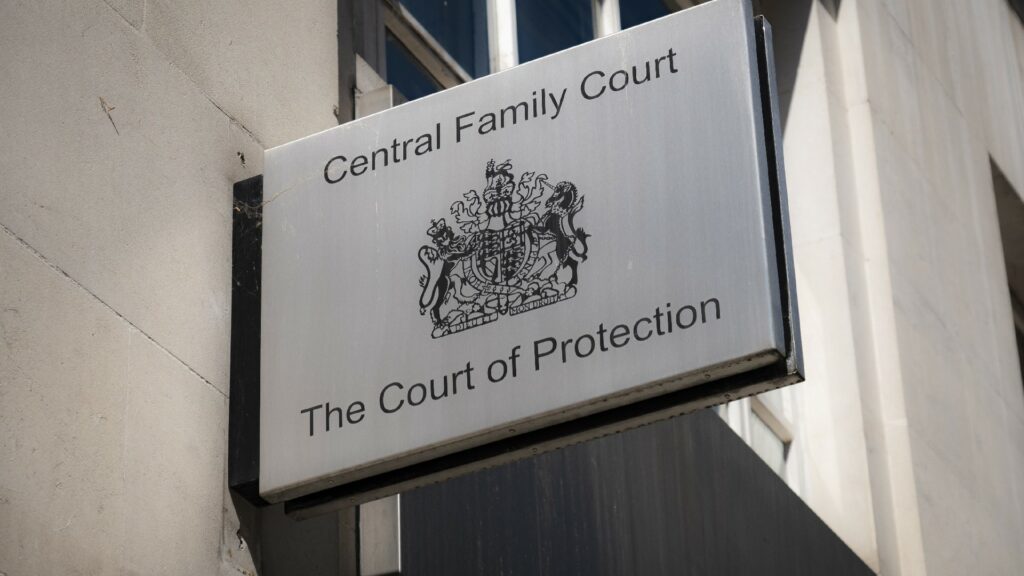Court of Protection Solicitors
Our private wealth solicitors can help when you need to make an application to the Court of Protection.
Court of Protection (COP)
When individuals lose the capacity to make decisions for themselves, the appointment of a deputy becomes essential to safeguard their interests. This process, governed by the Mental Capacity Act 2005 in the United Kingdom, involves a meticulous application to the Court of Protection. The Court of Protection helps with people who might be lacking the mental capacity to manage affairs or make their own decisions.
Court of Protection
The Court of Protection is a specialist branch of the Family Division of the High Court. It is based in London but there are various ‘hubs’ around the country. It deals with decisions or actions taken under the Mental Capacity Act. The cases are mostly heard by District Judges and a Senior Judge, sometimes a High Court Judge.
The Court of Protections broadly considers it’s work in two main areas – property and affairs and welfare, although sometimes these overlap. The Court must always act in the individual’s best interests and this is reiterated time and time again.
What does the Court of Protection do?
- Decides, after considering the available evidence, if someone lacks the mental capacity to make decisions for themselves in relation to their financial affairs and personal welfare
- Appoints a ‘Deputy’ who is a person who can make financial decisions for a person who has lost mental capacity, and in some cases for welfare decisions.
- Considers applications to make a Statutory Will (a Will that is made for someone who lacks mental capacity) and applications to make a gift on behalf of someone who lacks the mental capacity to make the gift themselves.
- Considers issues about Powers of Attorney and considers applications by those who object to a Lasting Power of Attorney in some way.
- Considers emergency applications where a decision has to be made without delay.
- Decides about when someone can be deprived of their liberty under the Mental Capacity Act.
Deputyship Application Process
It is sometimes necessary to apply to the Court of Protection for an Order relating to someone’s affairs when that person is unable to manage these for themselves. You will be required to submit a few forms and likely provide a doctor’s certificate.
The court will then be able to give the power to make decisions to someone who can manage their affairs and make decisions relating to issues around finance and health – usually a relative or close friend. They will become the ‘Deputy’.
We specialise in Court of Protection applications and our solicitors would be happy to complete the paperwork for you to ensure it is fully compliant.
Initiating a deputyship application involves several key steps of which we can assist with:
Capacity Assessment: A capacity assessment is conducted to determine whether the individual lacks the mental capacity to make decisions. This assessment is often carried out by medical professionals or social workers.
Deputyship Forms: The prospective deputy must complete the relevant deputyship application forms, which include details about the individual’s finances, family, and the specific decisions the deputy will be authorized to make.
Notifying Interested Parties: The Court of Protection requires the applicant to notify certain individuals, such as close relatives, of the deputyship application. This ensures transparency and allows interested parties to express their views on the appointment.
Court of Protection Application: The completed forms, along with any supporting documentation, are submitted to the Court of Protection. The court will review the application to ensure it meets all legal requirements.
Lasting Power of Attorney (LPA)
Often we get asked about the difference between the Lasting Power of Attorney (LPA) and Court of Protection.
What is the difference between Court of Protection and Lasting Power of Attorney?
Lasting Powers of Attorney (LPA) can be made at anytime, assuming you are of sound mental capacity, this is when you can choose who will manage your property, financial affairs and welfare when the time comes.
If someone has lost their mental capacity and they don’t have a Lasting Power of Attorney in place, an application will need to be made to the Court of Protection to appoint someone to act as a ‘deputy’. If successful they will receive an order telling them what they can and can’t do.
Understanding Deputyship
Deputyship is a legal arrangement that allows a designated individual, known as the deputy, to make decisions on behalf of someone who lacks the mental capacity to do so themselves. The deputy is typically a family member or a close friend, but in some cases, a professional may be appointed.
Who can be a deputy?
Anyone over 18 can be considered for deputyship, but preference is typically given to:
- Close family members or friends
- Professional deputies (solicitors, accountants, etc.)
- Local authority social workers (appointed as a last resort)
Key responsibilities of a deputy:
- Acting in the best interests of the person they are appointed for.
- Making decisions based on the person’s wishes and values, whenever possible.
- Keeping accurate records of their decisions and financial transactions.
- Reporting to the Office of the Public Guardian regularly.
Types of Deputyship
Property and Financial Affairs Deputyship: This type of deputyship allows the deputy to make decisions regarding the person’s financial matters, including managing bank accounts, paying bills, and handling property-related issues. The person who has lost capacity may require their home to be sold for purposes such as paying for care costs, and an application to the Court of Protection can be made to sell such property, however a person who is appointed as a Deputy for Property and Financial Affairs does not automatically receive authority to sell the property.
Personal Welfare Deputyship: A personal welfare deputy is granted authority to make decisions related to the individual’s healthcare, living arrangements, and other personal matters. This can be things as simple as a weekly hair cut that the person has always had or the diet of food they are eating, for example have they always been a vegetarian? If so, they should be able to continue doing so and a Deputy is appointed to ensure the persons general wellbeing is being taken care of.
Role of Court of Protection
The Court of Protection is a specialist branch of the Family Division of the High Court. It is based in London but there are various ‘hubs’ around the country. It deals with decisions or actions taken under the Mental Capacity Act. The cases are mostly heard by District Judges and a Senior Judge, sometimes a High Court Judge.
The Court of Protections broadly considers it’s work in two main areas – property and affairs and welfare, although sometimes these overlap. The Court must always act in the individual’s best interests and this is reiterated time and time again.
What does the Court of Protection do?
- Decides, after considering the available evidence, if someone lacks the mental capacity to make decisions for themselves in relation to their financial affairs and personal welfare
- Appoints a ‘Deputy’ who is a person who can make financial decisions for a person who has lost mental capacity, and in some cases for welfare decisions.
- Considers applications to make a Statutory Will (a Will that is made for someone who lacks mental capacity) and applications to make a gift on behalf of someone who lacks the mental capacity to make the gift themselves.
- Considers issues about Powers of Attorney and considers applications by those who object to a Lasting Power of Attorney in some way.
- Considers emergency applications where a decision has to be made without delay.
- Decides about when someone can be deprived of their liberty under the Mental Capacity Act.
Applying for Deputyship
It is sometimes necessary to apply to the Court of Protection for an Order relating to someone’s affairs when that person is unable to manage these for themselves. You will be required to submit a few forms and likely provide a doctor’s certificate.
The court will then be able to give the power to make decisions to someone who can manage their affairs and make decisions relating to issues around finance and health – usually a relative or close friend. They will become the ‘Deputy’.
We specialise in Court of Protection applications and our solicitors would be happy to complete the paperwork for you to ensure it is fully compliant.
Initiating a deputyship application involves several key steps of which we can assist with:
Capacity Assessment: A capacity assessment is conducted to determine whether the individual lacks the mental capacity to make decisions. This assessment is often carried out by medical professionals or social workers.
Deputyship Forms: The prospective deputy must complete the relevant deputyship application forms, which include details about the individual’s finances, family, and the specific decisions the deputy will be authorized to make.
Notifying Interested Parties: The Court of Protection requires the applicant to notify certain individuals, such as close relatives, of the deputyship application. This ensures transparency and allows interested parties to express their views on the appointment.
Court of Protection Application: The completed forms, along with any supporting documentation, are submitted to the Court of Protection. The court will review the application to ensure it meets all legal requirements.
Lasting Power of Attorney (LPA) vs Court of Protection
Often we get asked about the difference between the Lasting Power of Attorney (LPA) and Court of Protection.
What is the difference between Court of Protection and Lasting Power of Attorney?
Lasting Powers of Attorney (LPA) can be made at anytime, assuming you are of sound mental capacity, this is when you can choose who will manage your property, financial affairs and welfare when the time comes.
If someone has lost their mental capacity and they don’t have a Lasting Power of Attorney in place, an application will need to be made to the Court of Protection to appoint someone to act as a ‘deputy’. If successful they will receive an order telling them what they can and can’t do.
Understanding Deputyship
Deputyship is a legal arrangement that allows a designated individual, known as the deputy, to make decisions on behalf of someone who lacks the mental capacity to do so themselves. The deputy is typically a family member or a close friend, but in some cases, a professional may be appointed.
Who can be a deputy?
Anyone over 18 can be considered for deputyship, but preference is typically given to:
- Close family members or friends
- Professional deputies (solicitors, accountants, etc.)
- Local authority social workers (appointed as a last resort)
Key responsibilities of a deputy:
- Acting in the best interests of the person they are appointed for.
- Making decisions based on the person’s wishes and values, whenever possible.
- Keeping accurate records of their decisions and financial transactions.
- Reporting to the Office of the Public Guardian regularly.
Types of Deputyship
Property and Financial Affairs Deputyship: This type of deputyship allows the deputy to make decisions regarding the person’s financial matters, including managing bank accounts, paying bills, and handling property-related issues. The person who has lost capacity may require their home to be sold for purposes such as paying for care costs, and an application to the Court of Protection can be made to sell such property, however a person who is appointed as a Deputy for Property and Financial Affairs does not automatically receive authority to sell the property.
Personal Welfare Deputyship: A personal welfare deputy is granted authority to make decisions related to the individual’s healthcare, living arrangements, and other personal matters. This can be things as simple as a weekly hair cut that the person has always had or the diet of food they are eating, for example have they always been a vegetarian? If so, they should be able to continue doing so and a Deputy is appointed to ensure the persons general wellbeing is being taken care of.
FAQs
What decisions can the Court of Protection make?
The Court of Protection plays a crucial role in safeguarding the rights and interests of individuals who lack the mental capacity to make their own decisions. They exercise this role by holding the authority to make various decisions across different areas, primarily focusing on personal welfare, healthcare, and financial matters. Here’s a breakdown of some key decisions the Court of Protection can make:
Assessing Capacity:
- Determining whether someone has the mental capacity to make a specific decision for themselves. This assessment is based on the principles outlined in the Mental Capacity Act 2005.
Decision-Making on Behalf of Individuals:
- Making declarations, decisions, or orders regarding financial or welfare matters when an individual lacks capacity. This could involve:
- Managing their property and finances: paying bills, investing assets, selling property, etc.
- Making essential healthcare decisions: consenting to medical treatment, refusing non-beneficial treatment, etc.
- Arranging care and support: choosing suitable care homes, approving care plans, etc.
Appointing Deputies:
Appointing deputies to make ongoing decisions on behalf of someone who lacks capacity. Deputies can be individuals like family members or professional deputies appointed by the court.
Other Important Decisions:
Deciding whether a Lasting Power of Attorney (LPA) or Enduring Power of Attorney (EPA) is valid.
- Addressing concerns about the actions of attorneys or deputies, potentially removing them if necessary.
- Hearing cases concerning objections to registering LPAs or EPAs.
- Deciding on deprivation of liberty orders: authorizing restrictions on someone’s freedom in specific circumstances.
- Creating statutory wills on behalf of someone who lacks capacity.
It’s important to note that the Court of Protection always strives to act in the best interests of the individual when making any decisions. They consider factors like their wishes and feelings, capacity level, and any relevant medical reports.
Do I need permission to apply to the Court of Protection?
In some cases, you may need permission to apply to the Court of Protection. Please contact us if you’re unsure, and our private wealth team can advise you.
Is the Office of the Public Guardian the same as the Court of Protection?
No, the Office of the Public Guardian (OPG) and the Court of Protection are separate entities, although they play interconnected roles in the same legal process. While their names are sometimes used interchangeably, it’s important to understand their distinct functions:
Court of Protection:
- A specialist court, responsible for making legal decisions regarding individuals who lack capacity to make their own choices.
- Has the authority to issue declarations, orders, and appointments related to financial matters, healthcare, and personal welfare.
- Judges and legal professionals preside over cases in the Court of Protection.
Office of the Public Guardian:
- An executive agency that supervises deputies and attorneys appointed by the Court of Protection.
- Does not make legal decisions but ensures appointed deputies and attorneys act in accordance with the court orders and the Mental Capacity Act 2005.
- Provides guidance and support to deputies and attorneys through their website and helplines.
What is the Court of Protection? What does the Court of Protection do?
The Court of Protection is a quasi-governmental organisation with powers of a court and it manages the processes around the appointment of Deputies and the supervision, removal and appointment of Attorneys. It also guides Deputies and Attorneys on their decisions in relation to individuals who do not have capacity.
Do I need to apply to the Court of Protection?
If you are looking to manage the affairs of someone who has lost capacity and they do not have a suitable power of attorney in place, then yes. If you are looking for permission to deal with certain assets belonging to an individual who has lost capacity, then yes. If you are looking to have a Will prepared and authorised on behalf of someone who has lost capacity, then yes.
If the preson who has lost capacity has Lasting Powers of Attorney in place then you are most likely able to manage their affairs with those documents.
What is a Deputyship?
A Deputyship is an order from the court authorising one or more people to act on behalf of the individual who has lost capacity.
What are the different types of Deputyship?
Deputyship for Property and Financial affairs and Deputyship for Personal Welfare.
A Deputyship for Property and Financial affairs allows the Deputies to make decisions in regard to the patient’s property and finances such as assisting with a house sale or investing funds.
A Deputyship for Personal Welfare allows the Deputies to make decisions in regard to the patient’s health such as organising and agreeing to necessary vaccines and organising care. This is a much harder Order to obtain with the Court generally preferring only o grant the Orders where there is a specific Welfare/Health question to be decided on a one off basis.
When do I need to apply for a Deputyship?
When the Patient is 18 years or older and a medical assessment has been done to confirm they do not have capacity.
Can I apply for a Deputyship for a child?
No, the Patient needs to be 18 years old and above. However, the application can be prepared when the Patient is 17 years old.
Who can be a Deputy?
Any individual who is not bankrupt or has been convicted of fraud. This is ultimately for the court to approve. It would make sense that the person(s) applying to be a Deputy would be closely linked to the person for whom they are applying, unless the Deputy is a professional acting in their professional capacity.
Who needs a Deputyship order?
An individual who does not have capacity and their primary care givers need authority to continue to manage their affairs.
Do I need to apply for a Deputyship or a Lasting Power of Attorney?
If the individual has capacity then a Lasting Power of Attorney can be drafted. If the individual has already lost capacity then a Deputyship will need to be applied for through the Court of Protection.
Lorem ipsum dolor ist amte, consectetuer adipiscing eilt. Aenean commodo ligula egget dolor. Aenean massa. Cum sociis natoque penatibus et magnis dis parturient montes, nascetur ridiculus mus. Donec quak felis, ultricies nec, pellentesque eu, pretium quid, sem.
Court of Protection Insight
Meet the Team
Related expertise
Best Law Firms 2024
Herrington Carmichael has once again been named in the Times Best Law Firms. We were first listed in 2023 and have once again made the Best Law Firms list for 2024.














